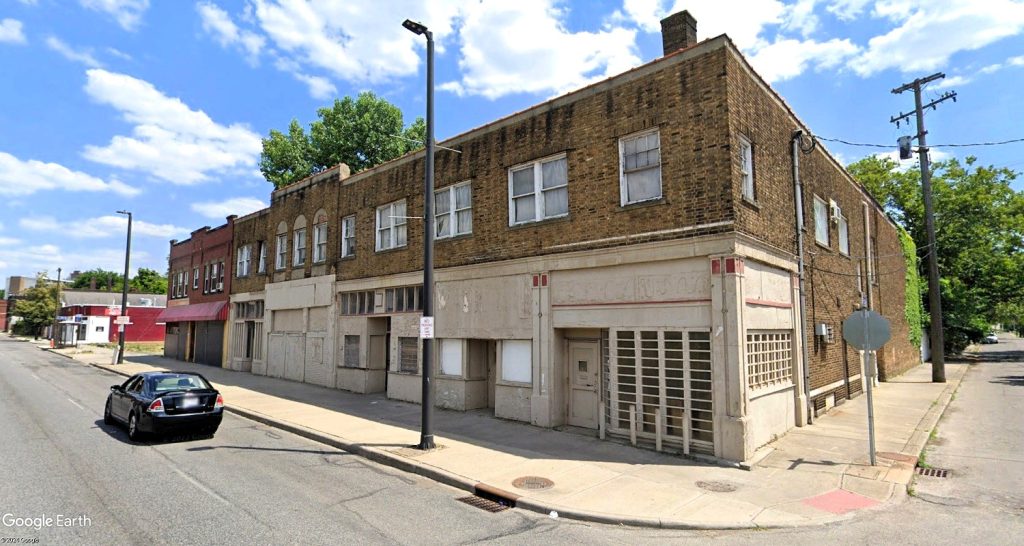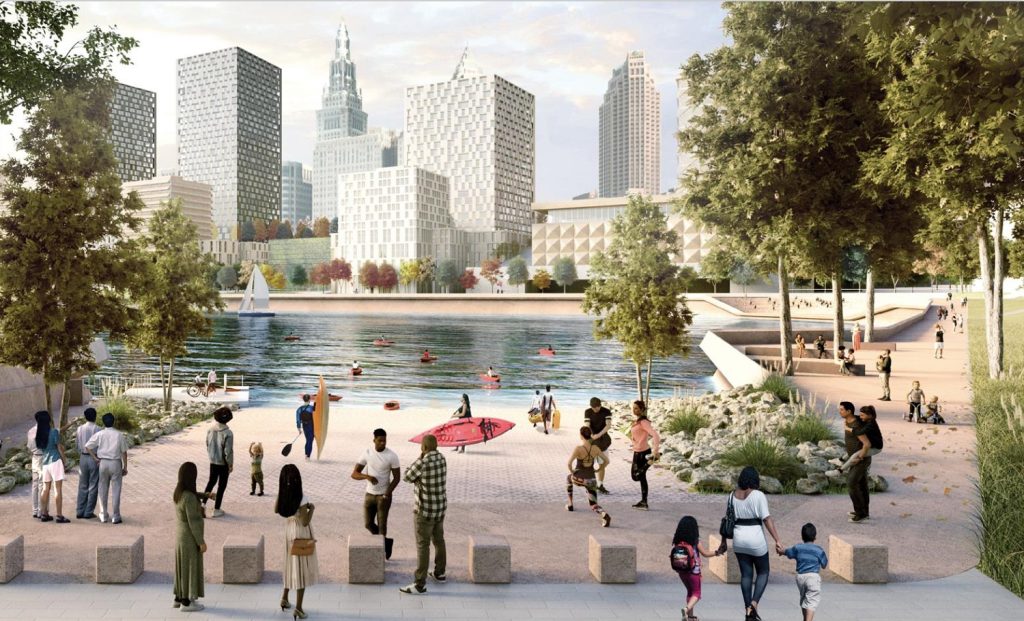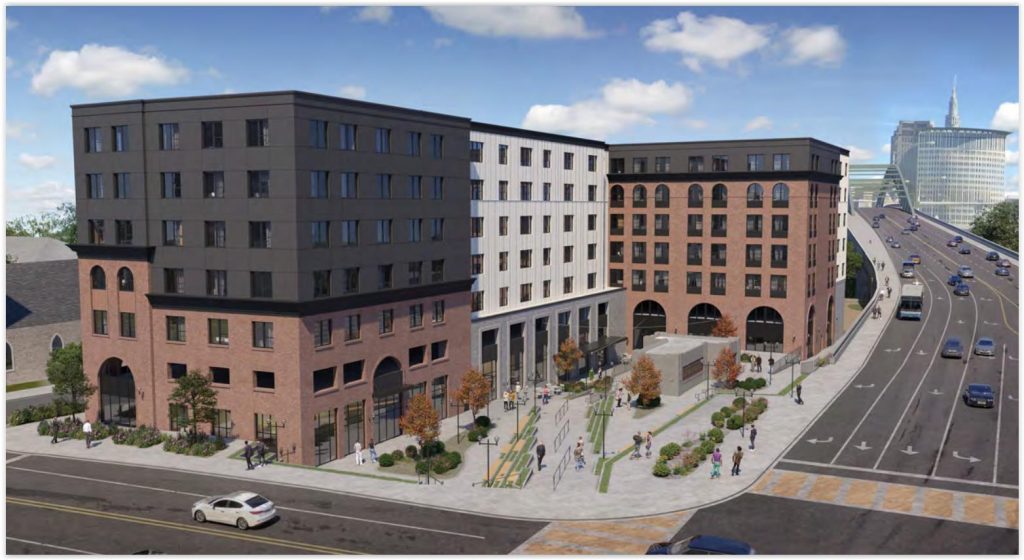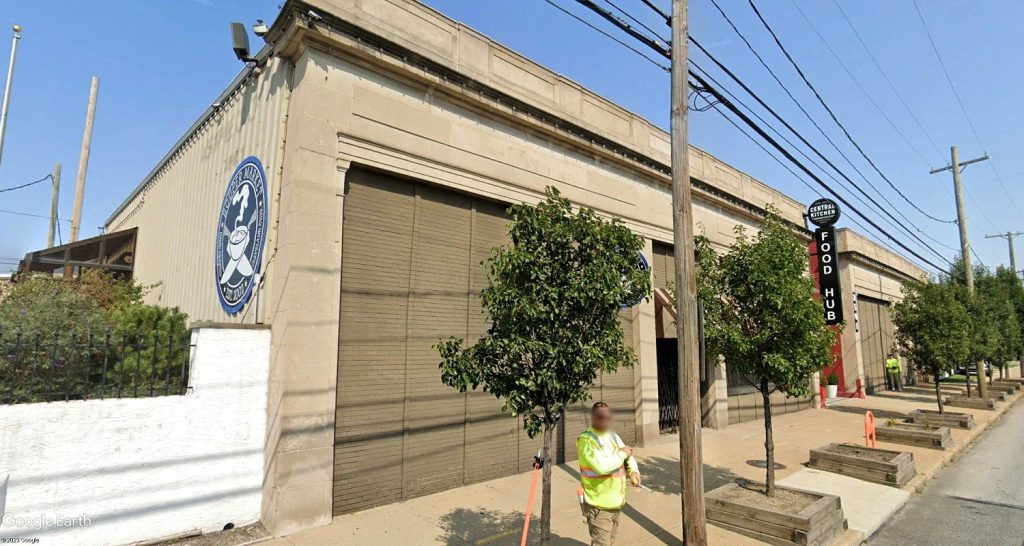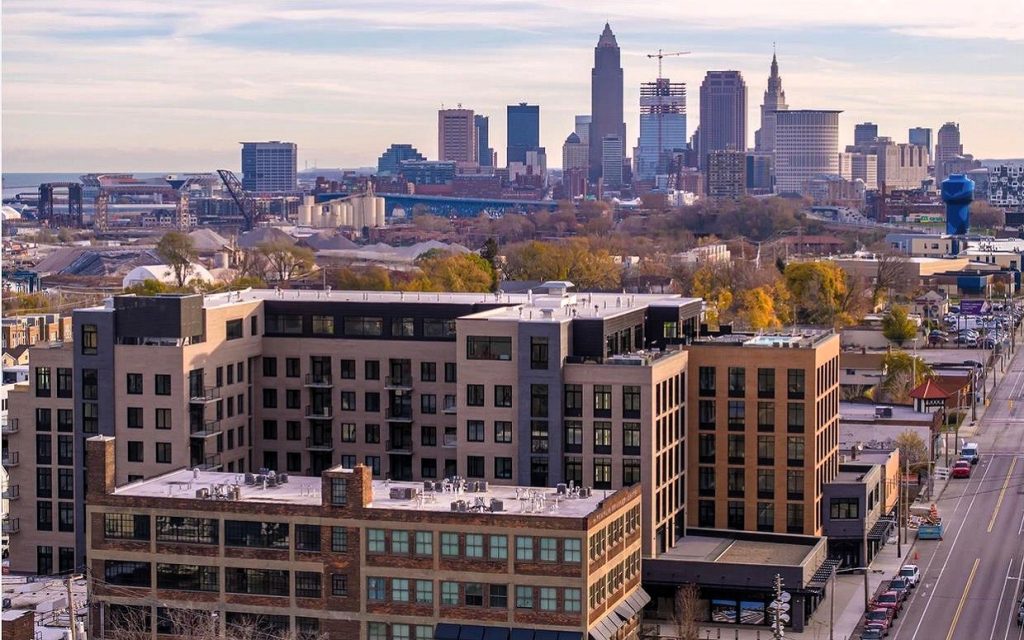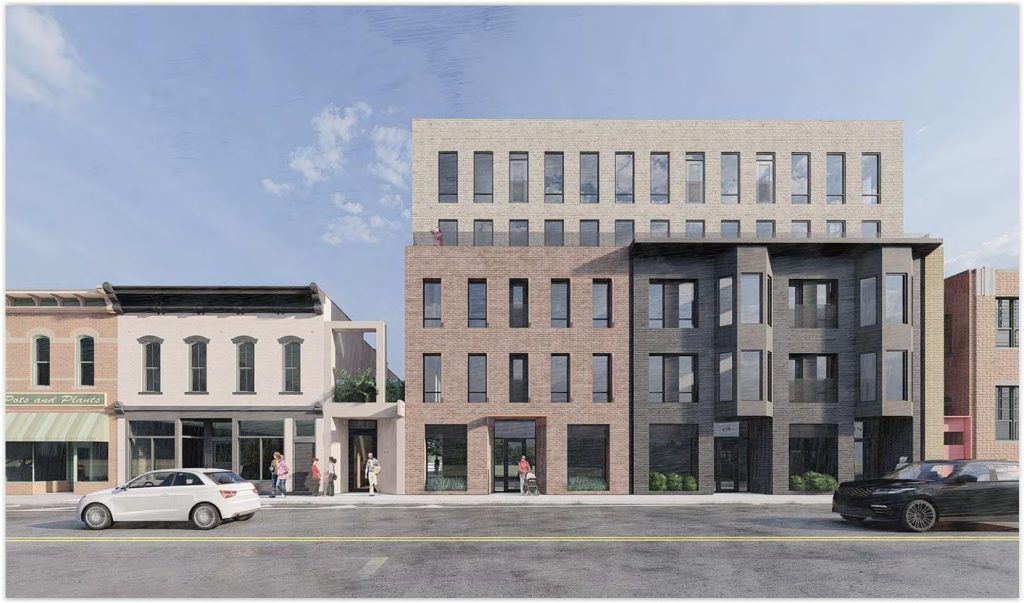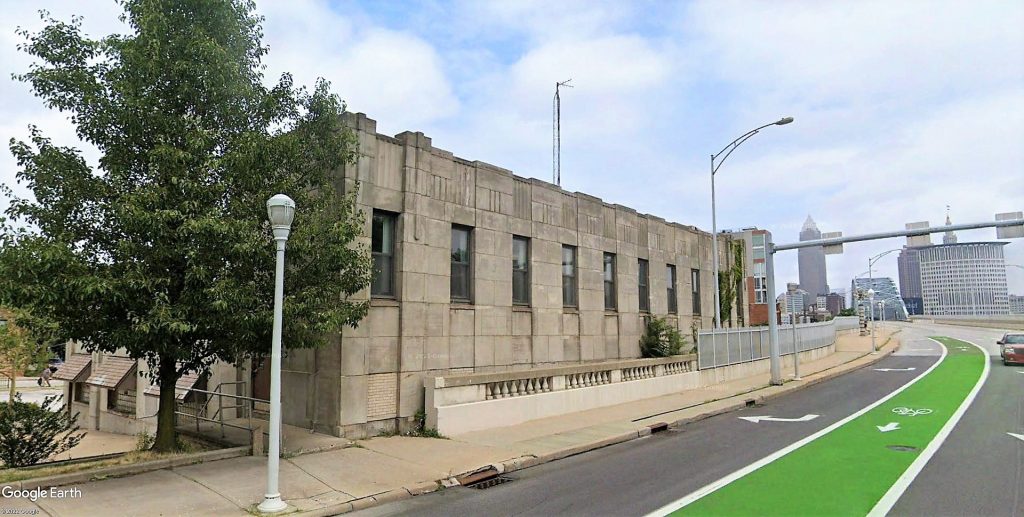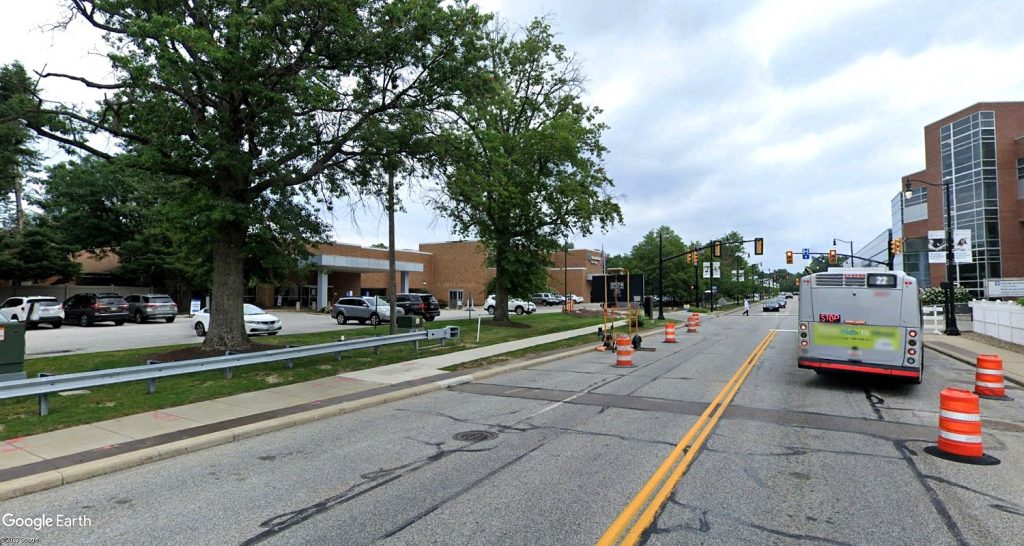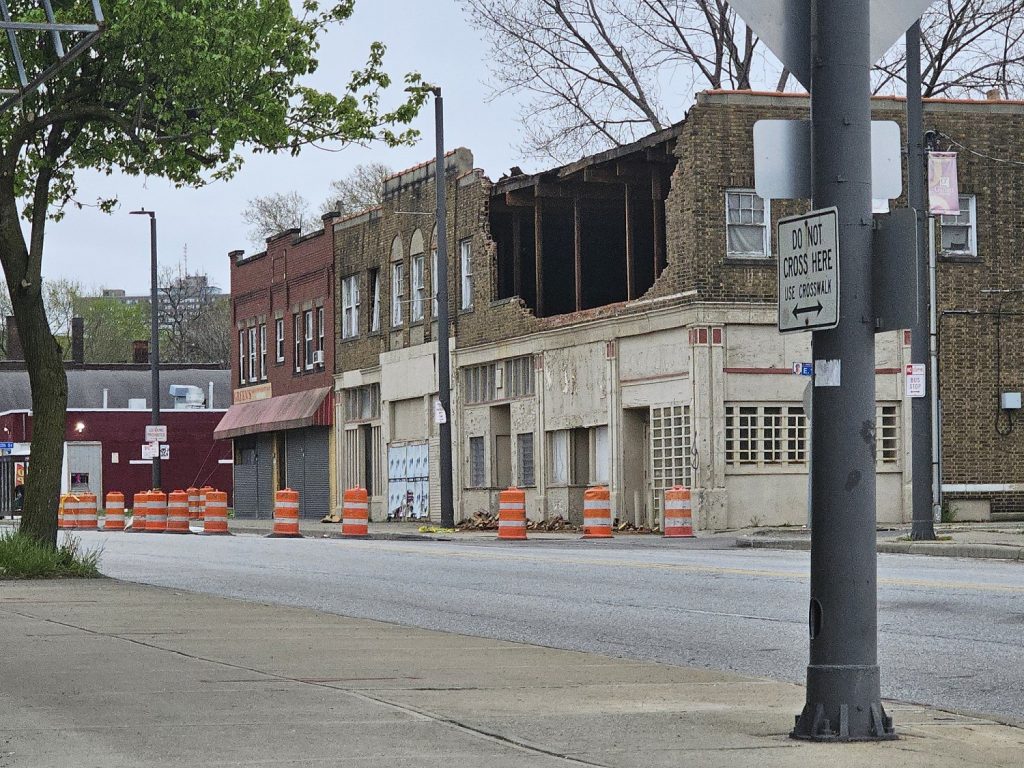
The south sidewalk and part of Superior Avenue in Cleveland’s Glenville neighborhood were closed off this past weekend as the former Ambassador Theatre building began collapsing into the street despite numerous warnings over the past month by city officials to immediately evacuate the occupied building and take it down (Khalid Hawthorne). CLICK IMAGES TO ENLARGE THEM.
Officials warned structure was ‘major safety hazard’
Despite multiple warnings over the past month by city officials of a potential collapse of the old Ambassador Theatre building, the building partially collapsed into Superior Avenue while a demolition request was due to be heard by a design-review committee in five days. Officials had instead urged an emergency evacuation of the occupied building and an expedited demolition.
No injuries were reported to the building’s lone occupant, to pedestrians or motorists when a second-floor wall at the front of the building collapsed. No details were available as to when it collapsed but it appeared to have happened in the last few days. The former Ambassador Theatre is located at 12408-18 Superior Ave. in Cleveland’s Glenville neighborhood.
The 99-year-old, 17,000-square-foot, two-story structure had one resident living in one of its 10 apartments above five vacant retail spaces, according to building records and a Cleveland Fire Department (CFD) inter-office memo from April 13.
That memo was sent from CFD Battalion 6 Chief Ken Latkovic to Alex Abromowitz, demolition bureau manager, recommending an emergency demolition be considered for this non-fire damaged structure as it constitutes “a hazard to the community and firefighters,” according to public records secured by NEOtrans.
In his hand-written notes, Latkovic noted a “partial building collapse. Investigation reveals rear of building is a severe collapse hazard. Building has one resident.”
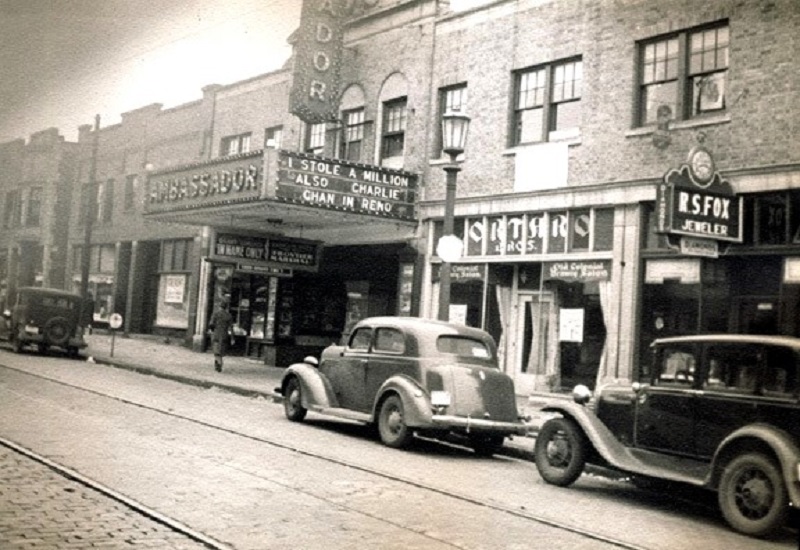
The Ambassador Theatre, like many urban theaters built during the emergence of motion pictures, featured a building with apartments over storefronts along a busy avenue with streetcars. The theater would instead be in a larger, single-use structure behind the mixed-use building. The Ambassador opened in 1925 (cinematreasures.org).
The rear of the building contains a former 1,000-seat movie theater which was not occupied but appeared from inspections that it was in the worst shape out of any other portion of the complex. Google satellite views going back to at least 2007 clearly showed holes in the theater’s roof while the front part of the building with the apartments and storefronts looked more solid. No demolitions were undertaken despite the fire department’s urging.
A city inspector visited the property on April 25, 12 days after the CFD demolition recommendation, and ordered the publicly listed property owner Patrick Gregory to vacate the property and fix numerous hazards and violations or appeal the order within 30 days. No permits or other documents were filed to suggest work had begun or was about to and no appeal was submitted, city records show.
“The exterior masonry walls are in need of pointing and/or repair,” Building Inspector Michael Shockley noted. “Large holes front-north rear-south: loose bricks constitute major safety hazard, serious bodily harm of life or limb. The integrity of the walls are of serious concern on collapsing throughout.”
The inspection also reported that the structure’s interior ceilings contain holes, cracks, loose, deteriorated material and/or are water-damaged. Throughout the building, “gaping holes” were found in the hallways from the entrance at 1305 E. 124th St., and on the top floor at the front and rear of the property known as 12408 through 12418 Superior. No smoke detectors were observed in the occupied building.
“Roof has holes throughout and is collapsing throughout front-north and rear-south,” Shockley continued. “The integrity of the roof structure is severely hampered and can totally collapse. Failure to comply with this notice will result in prosecutive action or penalty as provided by law.”
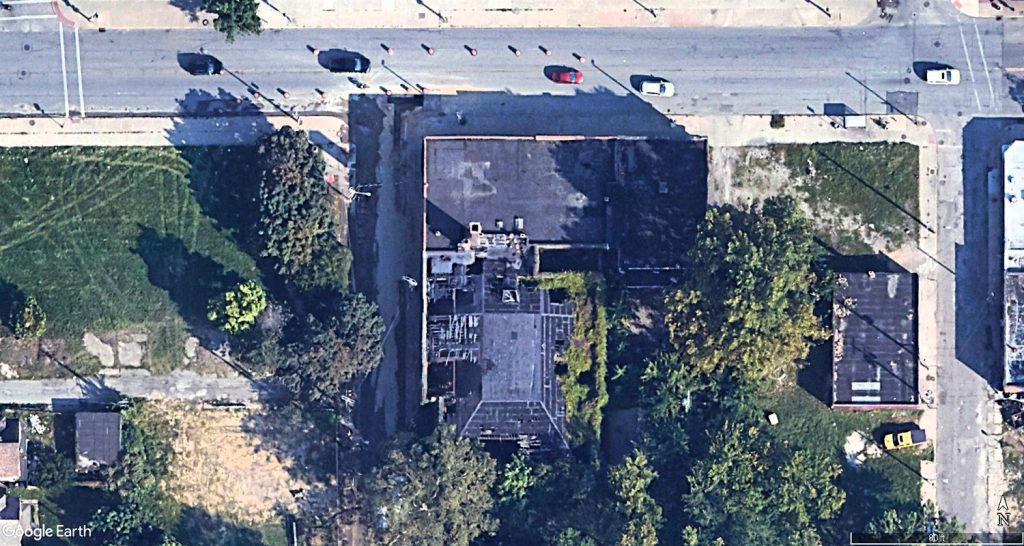
Over the last several years, holes in the roof over the theater portion of 12408-18 Superior Ave. appeared. This is the most recent Google view available, dating from July 31, 2023, showing large holes above the theater while the roof over the apartments-over-retail portion along Superior Avenue, at top, appeared to be in better condition (Google).
Despite these emergency conditions, and instead of immediately demolishing the building, a demolition case for the structure was opened by the City Planning Commission and was submitted to the commission’s Design Review Committee. It was placed on the committee’s May 17 agenda for consideration. The old theater complex is not a designated landmark and it is not located in an historic district.
NEOtrans has reached out to Planning Director Joyce Pan Huang and to Ward 9 City Councilman Kevin Conwell for comment. So far, neither has replied. This article will be updated if and when either person responds.
Property owner Gregory could not be located by NEOtrans for comment. He listed his contact information at the former Ambassador Theatre building. Records show he formerly lived at 703 Eddy Rd. in Glenville but that house is no longer there. Cuyahoga County online database says he bought the theater complex and its 0.354-acre property in 1979 for $30,000. City records list multiple building code violations for the property going back to 1993.
Community development officials had hoped to save the former Ambassador Theatre building, or at least the front part facing Superior. Several apartment developments are planned or underway on Superior from East 105th Street east to the East Cleveland line about 150 feet east of the theater.
They include the Garrett Square Apartments, 1282 E. 125th St., now under construction right across Superior from the Ambassador Theatre. Also the Emerald Senior Apartments, 11100 Superior, and the Gold Coast Lofts at East 105th, are planned next. Demolition of the theater complex is considered by development officials to be a setback for the neighborhood.
“Definitely sad because these storefront buildings are the infrastructure for community revitalization,” said Khalid Hawthorne, real estate development director at the Famicos Foundation, a community development corporation for the area. “They provide opportunities for future entrepreneurs and rehabbed apartments above are usually more affordable than new construction. Historically, demolished buildings have turned into parking lots on East 105th.”
He noted that Famicos is partnering with Greg Baron, managing director of development-Midwest of Wisconsin-based Commonwealth Cos., to develop the Garrett Square Apartments. It will feature 49 affordable apartments for seniors aged 55 and older who have incomes between 30 percent and 60 percent of the area’s median income.
“While our current focus is based on the MyGlenville neighborhood plan for developing a cultural district around East 105th, the Superior commercial corridor will help to connect the northern and southern parts of Glenville,” Hawthorne added.
The Ambassador Theatre complex was built by the Louis Abrams Co. of Cleveland for $150,000, according to the 1924 edition of The American Contractor. The architect was listed as John Stegens but appears to be in error. The architect was probably John F. Steffens, who worked in Cleveland from about 1912 until 1943.
The Plain Dealer listed the theater in its movie listings from 1925-51. A May 1961 article in the Elyria (OH) Chronicle Telegram reported that the theater was purchased by “the Black Muslims” to use as a mosque. The article said the theater had previously served as a Christian church, as described in notes at cinematreasures.org.
END

